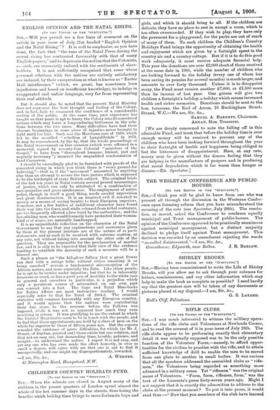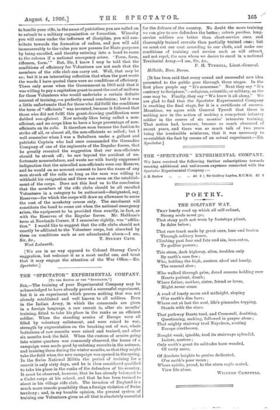RIFLE CLUBS.
[To TICE EDITOR OF TILE "SPECTATOR.'] SIR,—I was much interested to witness the military opera- tions of the rifle clubs and Volunteers at Newlands Corner, and to read the account of it in your issue of July 28th. The rifle clubs appear to be performing exactly that elementary detail it was originally supposed was to be the only possible function of the Volunteer Force,—namely, to afford oppor- tunities for the civilian to practise with the rifle, and to attain sufficient knowledge of drill to enable the men to be moved from one place to another in small bodies. It was curious that all the speakers addressed the assembled clubs as "rifle- men," the Volunteers being regarded as something more advanced in a military sense. Yet " riflemen " was the original name of Volunteers. "Form, form, riflemen, form," was the text of the Laureate's poem forty-seven years ago. Might I not suggest that it is exactly the admonition to address to the clubs at the present moment ? To put it into prose, it would read thus :—" Now that you members of the club have learned to handle your rifle, in the name of patriotism you are called on to submit to a military organisation or formation. Whereby you will come under the influence of discipline, you will con- tribute towards the formation of cadres, and you will add immeasurably to the value you now possess for State purposes by being enrolled, and thereby entering into a bond to come to the colours if a national emergency arises. Form, form, riflemen, form.' " But, Sir, I know I may be told that the conditions of efficiency for Volunteers are not such that the members of the rifle club can carry out. Well, that may be so; but it is an interesting reflection that when the poet wrote the words I have quoted there were no conditions of efficiency. These only arose when the Government in 1863 said that it was willing to pay a capitation grant to meet the cost of uniform for those Volunteers who would undertake a certain definite amount of training,—a perfectly sound conclusion; but it was a little unfortunate that for those who did fulfil the conditions the term of " efficients" was invented, because it followed that those who did not fulfil this grant-drawing qualification were dubbed non-efficient. Now nobody likes being called a non- efficient, and no corps likes to have a large percentage of non- efficients on its rolls. It therefore soon became the fashion to strike off all, or almost all, the non-efficients so called ; but I well remember when I was a Subaltern under a gallant and patriotic Captain who had once commanded the Grenadier Company of one of the regiments of the Regular forces, that he greatly resented the suggestion that our non-efficients should be struck off; he saw beyond the accident of un- fortunate nomenclature, and wrote me with barely suppressed indignation that the miscalled non-efficients were our Reserve, and he would on no account consent to have the name of any man struck off the rolls so long as the man was willing to withhold his resignation and there was room on the establish- ment of the corps. Does not this lead us to the conclusion that the members of the rifle clubs should be all enrolled Volunteers in a category to be authorised—designated, say, Reserves—for which the corps will draw an allowance to cover the cost of the musketry course only. The enrolment will constitute the bond to come out when the national emergency arises, the equipment to be provided then exactly, in fact, as
with the Reserves of the Regular forces. Mr. Haldane's term at Newlands Corner, if I remember rightly, was "affilia- tion." I would like to suggest that the rifle clubs should not exactly be affiliated to the Volunteer corps, but absorbed by them on conditions such as are adumbrated above.—I am, [We are in no way opposed to Colonel Sturmy Cave's suggestion, but welcome it as a most useful one, and trust that it may engage the attention of the War Office.—ED. Spectator.]







































 Previous page
Previous page